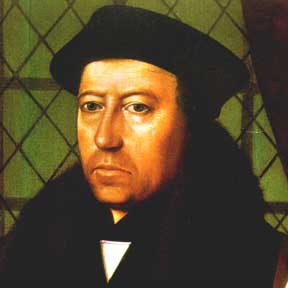*I have cited it in the sources below, but I owe much of the inspiration and information for this post to Dr. Stephen Nichols book The Reformation.
—–
It is common in matters of Reformation Church History to primarily speak of these great figures and martyrs of its time: Luther, Calvin, Zwingli, Bullinger, Beza, Cranmer, Knox, Cromwell, Bunyan, etc. Do you notice one thing in common with all of these names? It is not that they’re all White Europeans or that they had epic beards; no, the trait all of these names have in common are that they all belong to men.
Did you know that there are great heroines of the Reformation? While fewer in number their heart, bold speech and mighty actions equal, rival and often tower over the men of their time. There is one woman in particular whose actions warm my heart, stir my affections for Jesus and stand out as a mighty figure in church history.
But before we can address this great heroine of the Reformation, we must first take a step back in time to tell the soap opera tale of a certain English king and his ill-suited Queens – all seven of them.
King of Queens
King Henry VIII was a king known for his devout and persistent Roman Catholic faith. He was not only a king, but was known for being something of a theologian; in 1521 he refuted Martin Luther and defended Roman Catholic theology in a book entitled The Defense of the Seven Sacraments. The pope at the time, Leo X, praised Henry and gave him the title of “Defender of the Faith.” So long as Henry was on the throne, it appeared impossible for the German or Swiss Reformation to come anywhere near England.
But all was not as it seemed. Henry was married to his first wife Catherine, and after six children (only one of which survived, Mary – remember her for later), Henry was not satisfied without having a male heir. Seeking this heir, he wanted an annulment from Catherine, something the Roman church was either not willing to provide or was taking too long to decide.
Enter Thomas Cranmer: the Archbishop of Canterbury and a man influenced by the turning tides of the Reformation who sought deep reform in England. Seizing the opportunity, Cranmer influenced Henry and told him that he would grant him annulment if Henry would break from the pope and the Roman Catholic church.
In 1534 Henry and Parliament signed and declared the Act of Supremacy, officially breaking from all papal and Roman authority. It is for this reason the first 14 years of the English Reformation is often called the Henrician Reformation. Henry had already married Anne Boleyn, who also failed to produce a male heir. Instead, her only surviving child was another daughter, Elizabeth. Cranmer was soon called upon to annul another marriage and Queen Anne was beheaded. Henry married Jane Seymour, who died giving birth to Henry’s only son Edward. The King then married Anne of Cleeves, and that marriage was soon annulled. His next marriage was to Catherine Howard, who had affairs and was tried and beheaded for treason. Henry’s last marriage was to Catherine Parr in 1543. He died four years later.
King Edward VI, then nine-years-old was put on the throne. Edward was a sickly child, and being only nine years in age, Cranmer was able to use the time of Edwards rule to push for the most serious of reforms. King Edward died a few years later in 1553.
My Heroine, Lady Jane Grey
This is where things get even more interesting. During the latter portion of Henry’s rule, England had distanced itself from Rome by abolishing Papal authority and either purchasing or destroying Rome’s many monasteries and churches. While Edward was on the throne and Cranmer pushed for sweeping reforms, England became known as being much more Protestant than Roman Catholic. The problem was that the next heir to the throne was Mary, from Henry’s second marriage. Mary was Roman Catholic in her DNA, so her ascent to the throne threatened to dismantle the Reformation that had taken hold in Britain.
Those committed to the cause of the Reformation entered into a political frenzy. Their plan was to halt the ascension of Mary by instead putting King Henry’s grandniece Lady Jane Grey on the throne. She was only sixteen years in age.
However committed to the Reformation England was, they were more committed to the royal blood-right of kings, so this political maneuver did not end well for Lady Jane nor her followers. Immediately following Lady Jane Grey’s placement on the throne as queen, Mary and her followers overcame the small resistance in support of Lady Jane and had them all arrested. But Lady Jane Grey was not your average sixteen-year-old teenage girl. Grey was highly trained and educated, especially in Biblical studies. She knew the original languages, and corresponded regularly with the leading Swiss Reformer Heinrich Bullinger.
Can you imagine? Lady Jane lived in a time where very few women had any kind of education, but to be this specialized? As we will see, Lady Jane could keep up with the best of the Reformation theologians. Whats more, not only was she highly and uniquely trained as a sixteen year old girl (or for anyone for that matter), but she did not merely posses head knowledge but was very mature in her passion and heart for Jesus as well. Look at what she wrote to her sister Catherine shortly after her arrest:
I have here sent you, Good sister Catherine, a book, which although it be not outwardly trimmed with gold, yet inwardly it is worth more than precious stones. It is the book, dear sister, of the law of the Lord…
Rejoice in Christ, as I do. Follow the steps of your master Christ, and take up your cross. Lay your sins on his back, and always embrace him. And as touching my death, rejoice as I do, good sister, that I shall be delivered of this corruption, and put on incorruption. For I am assured, that I shall, for losing of a mortal life, win an immortal life.
Unfortunately, “Bloody Mary” is not just the name of a tasty cocktail but was the name given to this Queen Mary who had arrested our dear Lady Jane. Sensing that Lady Jane was nothing more than a pawn in a political scheme, she offered life and peace to Grey by giving her the option of participating in Roman Mass. If she would but partake, Mary would give her life instead of condemn her. Being only sixteen, you’d think Lady Jane would delight at such an offer. But the cost was too high for our heroine. Jane Grey was so appalled at the thought of converting back to Catholicism that she chastised her former tutor and family chaplain at the news that they had converted back to Catholicism:
How canst thou having knowledge, or how darest thou neglect the law of The Lord, and follow vain traditions of men? And whereas thou hast become a public professor of his name, become now a defacer of his glory. I will not refuse the true God, and worship the invention of man, the golden calf, the whore of Babylon, the romish religion, the abominable idol, the wicked mass: wilt thou torment again, rend and tear the most precious body of our Savior Christ with thy bodily and fleshly teeth without the breaking whereof upon the cross, our sins and transgressions, could else no way be redeemed? Wilt thou take upon thee to offer up any sacrifice unto God for our sins, considering that Christ offered up himself upon the cross, a lovely sacrifice once for all?
Lady Jane was soon quizzed by Mary’s archbishop, Feckenham. Jane stood up against his challenges of the teachings of Scripture and the principles of the Reformation. Trying to trick Jane on the issue of justification, Feckenham said this: “It is necessary unto salvation to do good works also; it is not sufficient only to believe.” Lady Jane responded with an articulation of the doctrine of justification that would make Luther tremble:
I deny that, and I affirm that only faith saves; but it is meet for a Christian to do good works, in token that he follows the steps of his Master, Christ, yet may we not say that we profit to our salvation; for when we have done all, we are unprofitable servants and faith only in Christ’s blood saves us.
Lady Jane Grey was only on the throne for nine days, and was executed a few months after arrest shortly after her seventeenth birthday. Now known as the nine-day queen, she was martyred for her beliefs on February 12, 1554. Her last words on the scaffold were: I here die a true Christian woman and I trust to be saved by the blood of Christ, and by none other means.
Lady Jane might not have accomplished as much as some of the titans of the Reformation, but her faith in adversity was uniquely powered by the work of the Holy Spirit in her life. Grey’s dedication to a strong head and an even softer heart provides a model for all Christians. Her boldness and desire to know Christ intimately – even at such a young age, even amidst the immense difficulties for a seventeen-year-old girl to obtain such an education – is inspiring to us today.
Semper Reformanda
—–
Sources:
Collinson, Patrick. The Reformation: a History (Modern Library Chronicles). new york: Modern Library, 2006.
Foxe, John. Foxe’s Book of Martyrs. Orlando, FL: Bridge-Logos, 2007.
Nichols, Stephen J. The Reformation: How a Monk and a Mallet Changed the World. Wheaton, IL: Crossway, 2007.
From “A Short Declaration of the True, Lively and Christian Faith”
A man may soon deceive himself, and think in his own fantasy that he by faith know God, love him, fear him, belong to him, when in very deed he doth nothing less.
For the trial of all these things is a very godly and Christian life. He that feel his heart set to seek God’s honor, and studies to know the will and commandments of God, and to frame himself thereunto, and leads not his life after the desire of his own flesh, to serve the devil by sin, but sets his mind to serve God for God’s own sake, and for His sake also to love all his neighbors, whether they be friends or adversaries, doing good to every man, as opportunity serves, and willingly hurting no man ; such a man may well rejoice in God, perceiving by the trade of his life that he unfeignedly hath the right knowledge of God, a lively faith, a steadfast hope, a true and unfeigned love and fear of God. But he that casts away the yoke of God’s commandments from his neck; and gives himself to live without true repentance, after his own sensual mind and pleasure, not regarding to know God’s word, and much less to live according thereunto ; such a man clearly deceives himself, and sees not his own heart, if he thinks that he either know God, loves him, fears him, or trusts in him.
Some peradventure fancy in themselves that they belong to God, although they live in sin; and so they come to the Church, and show themselves as God’s dear children. But St. John says plainly, If we say that we have any company with God, and walk in darkness, we do lie.
Others do vainly think that they know and love God, although they pass not of his commandments. But St. John says clearly, He that says, I know God, and keeps not his commandments, is a liar.
Some falsely persuade themselves, that they love God, when they hate their neighbors. But St. John says manifestly, If any man say, I love God, and yet hates his brother, he is a liar. He that says that he is in the light, and hates his brother, he is still in darkness. He that loves his brother dwells in the light; but he that hates his brother is in darkness, and walks in darkness, and knows not whither he goes: for darkness hath blinded his eyes. And moreover he says, Hereby we manifestly know the children of God from the children of the devil: He that doth not righteously is not the child of God, nor he that hates his brother.
Deceive not yourselves, therefore, thinking that you have faith in God, or that you love God, or do trust in him, or do fear him, when you live in sin : for then your ungodly and sinful life declares the contrary, whatsoever you say or think. It pertains to a Christian man to have this true Christian faith; and to try himself whether he hath it or no; and to know what belongs to it, and how it doth work in him. It is not the world that we can trust to ; the world, and all that is therein, is but vanity. It is God that must be our defense and protection against all temptation of wickedness and sin, errors, superstition, idolatry, and all evil. If all the world were on our side, and God against us, what could the world avail us? Therefore let us set our whole faith and trust in God, and neither the world, the devil, nor all the power of them, shall prevail against us. Let us therefore, good Christian people, try and examine our faith, what it is ; let us not natter ourselves, but look upon our works, and so judge of our faith what it is. Christ himself speaks of this matter, and says, The tree is known by the fruit. Therefore let us do good works, and thereby declare our faith to be the lively Christian faith. Let us, by such virtues as ought to spring out of faith, show our election to be sure and stable; as St. Peter teaches, Endeavour yourselves to make your calling and election certain by good works. And also he says, Minister or declare in your faith virtue, in virtue knowledge, in knowledge temperance, in temperance patience, in patience godliness, in godliness brotherly charity, in brotherly charity love. So shall we show indeed that we have the very lively Christian faith; and may so both certify our conscience the better that we be in the right faith, and also by these means confirm other men. If these fruits do not follow, we do but mock with God, deceive ourselves, and also other men.
Well may we bear the name of Christian men, but we do lack the true faith that doth belong thereunto: for true faith doth ever bring forth good works; as St. James says, Show me thy faith by thy deeds. Thy deeds and works must be an open testimonial of thy faith: otherwise thy faith, being without good works, is but the Devil’s faith, the faith of the wicked, a fantasy of faith, and not a true Christian faith. And like as the devils and evil people be nothing the better for their counterfeit faith, but it is unto them the more cause of damnation ; so they that be christened, and have received knowledge of God and of Christ’s merits ; and yet of a set purpose do live idly, without good works ; thinking the name of a naked faith to be either sufficient for them, or else, setting their minds upon vain pleasures of this world, do live in sin without repentance, not uttering the fruits that do belong to such an high profession; upon such presumptuous persons and willful sinners must needs remain the great vengeance of God, and eternal punishment in hell, prepared for the unjust and wicked livers.
Therefore as you profess the name of Christ, good Christian people, let no such fantasy and imagination of faith at any time beguile you; but be sure of your faith; try it by your living; look upon the fruits that come of it; mark the increase of love and charity by it towards God and your neighbor; and so shall you perceive it to be a true lively faith. If you feel and perceive such a faith in you, rejoice in it; and be diligent to maintain it and keep it still in you ; let it be daily increasing, and more and more be well working ; and so shall you be sure that you shall please God by this faith ; and at the length, as other faithful men have done before, so shall you, when his will is, come to him, and receive the end and final reward of your faith, as St. Peter names it, the salvation of your souls. The which God grant us, that hath promised the same unto his faithful ; to whom be all honor and glory, world without end.
Amen.



